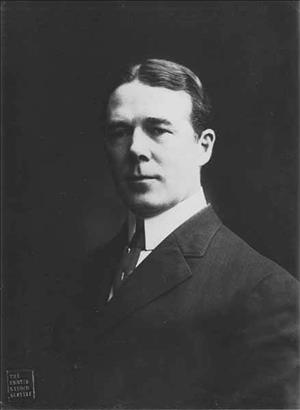On June 12, 1913, the Board of Regents for the University of Washington votes to ask for the resignation of President Thomas Franklin Kane (1863-1938), effective August 1, 1914, to allow time before the new school year begins to find a replacement. The board cites its doubts about Kane's leadership as the reason for his dismissal, whereas his supporters claim that he is the victim of conservative politicians who want to rein in academic freedom.
Kane's Accomplishments
Kane came to the University in 1900 as a professor of Latin. He was made acting president in 1902 and president the following year. Under his leadership, enrollment at the University grew from 600 to 3,300, and he established the beginnings of the schools of Forestry and Journalism, the Friday Harbor Laboratories, the summer school, and chairs in Scandinavian and Japanese languages. After the Alaska Yukon Pacific Exposition in 1909, the University took possession of several new buildings and a much improved campus. He also recruited a number of important faculty members including the renowned Professor of Literature and author of Main Currents in American Thought, Vernon Louis Parrington (1871-1929).
During the election of 1912, the Board of Regents prohibited on-campus appearances of political candidates. The Board was concerned that students, most of whom were under age or non-residents of King County, might be encouraged to break the law by voting. Kane reluctantly enforced this rule. When Seattle Times publisher Alden J. Blethen (1845-1915) donated some chimes to the university, students wrote an open letter calling him "one of the most malign influences in the State of Washington" and complaining of his "persistent and shameless ridicule of morality and virtue." (Blethen and The Times supported an "open town" in Seattle where prostitution and gambling were permitted.)
When Kane learned that the letter would be published in The Daily, he shut down the paper and suspended the student editor. Students handed out copies of the letter at the dedication of the chimes on October 22, 1912, and thereby succeeded in embarrassing Blethen.
The matter was referred to a faculty committee, which recommended discipline for the student protesters, but the faculty and Kane took no action. A new Board of Regents was appointed by the new governor in 1913. Historian Charles M. Gates writes that Kane's
"constant reliance upon faculty committees and faculty judgement implied a voluntary acceptance of limits upon his own authority and gave a quality of indecisiveness to his dealings with this board which helped to cause dissatisfaction. The regents believed the government should be sharply focused rather than diffuse."
In December 1913, after Kane had refused to submit his resignation, the board made his termination effective on January 1, 1914. Kane went on to be president of Olivet College in Michigan and from 1918 to 1933, president of the University of North Dakota.
The Blethen chimes were destroyed by fire in 1949.

